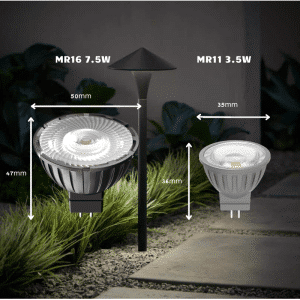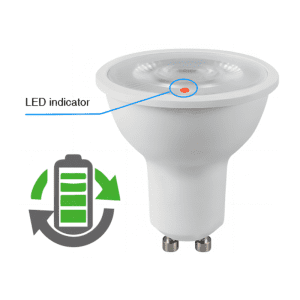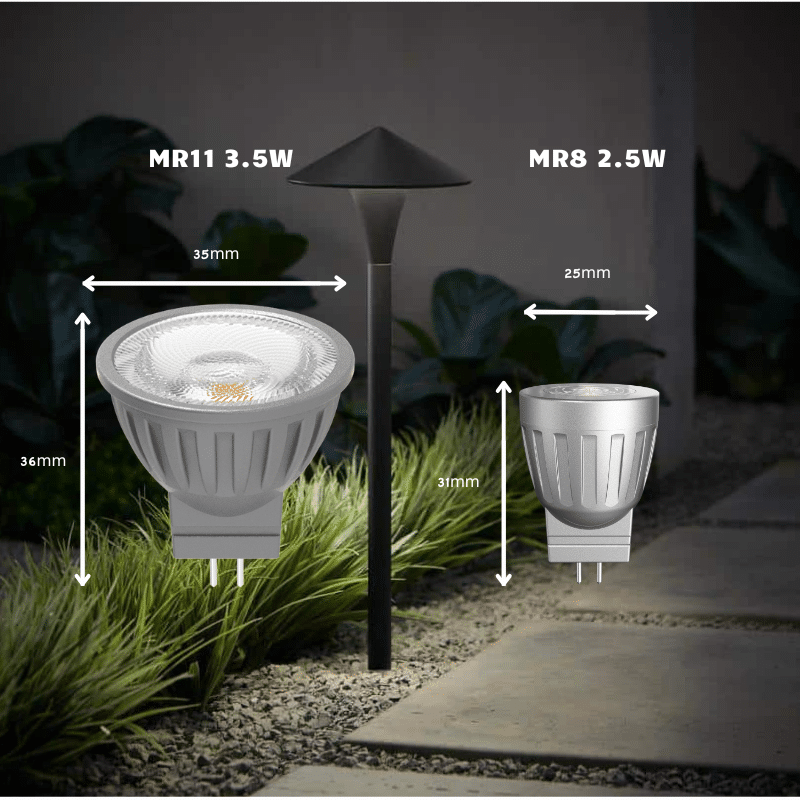
Navigating the world of lighting can feel overwhelming—so many choices! But understanding the differences between MR11 and MR16 bulbs can make it a lot easier.
MR11 and MR16 bulbs differ primarily in size, wattage, and light output. MR11 bulbs are smaller, have lower wattage, and are suitable for compact spaces, while MR16 bulbs offer higher lumens and better dimming performance, making them ideal for larger fixtures.
This overview is just the tip of the iceberg! Dive in with me as we explore their applications, energy efficiency, and how they can transform your lighting experience.
MR11 bulbs are larger than MR16 bulbs.False
MR11 bulbs measure approximately 35mm, smaller than MR16's 50mm.
How Do MR11 and MR16 Bulb Sizes Compare?
Understanding bulb sizes can help you make better lighting choices for your space.
MR11 bulbs are generally smaller than MR16 bulbs, with the MR11 measuring approximately 35mm in diameter compared to the MR16’s 50mm. This size difference impacts their fitting compatibility and application, as MR11 is suited for compact fixtures, whereas MR16 is preferable for larger lighting setups.
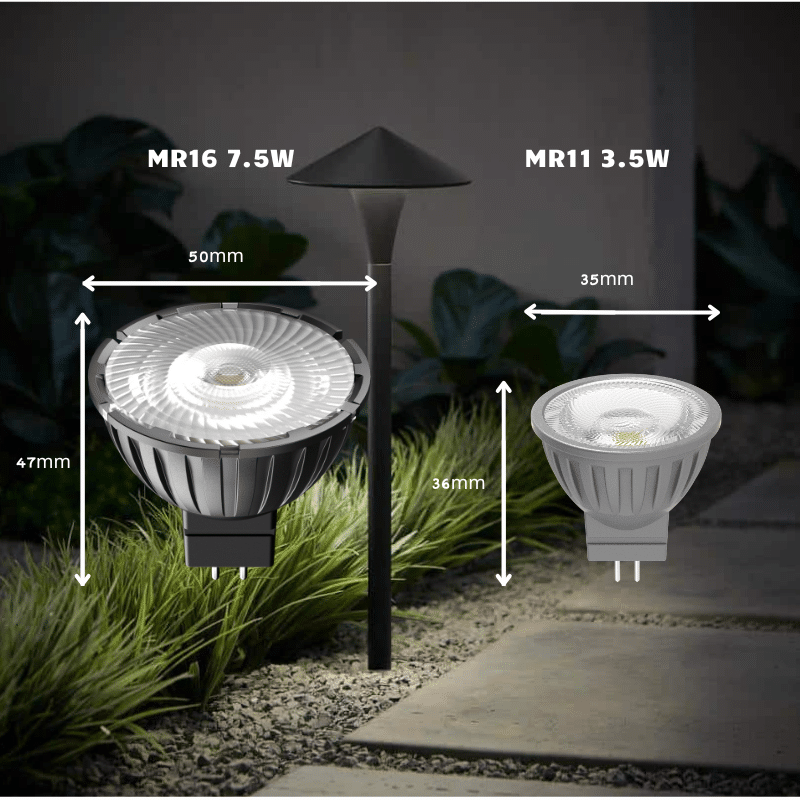
Understanding Bulb Sizes: MR11 vs. MR16
The most noticeable difference between the MR11 and MR16 bulbs1 lies in their physical dimensions. The ‘MR’ in their names stands for "multifaceted reflector," and the numbers indicate the bulb’s diameter in eighths of an inch.
-
MR11 Bulb Size: Typically, the MR11 measures approximately 35mm in diameter, making it a popular choice for small and compact fixtures. This bulb is ideal for tight spaces such as cabinet lights or small display cases.
-
MR16 Bulb Size: On the other hand, the MR16 bulb measures about 50mm in diameter. Its larger size allows it to fit in bigger fixtures and deliver a more powerful light output. This makes MR16 a preferred option for larger downlights and track lighting systems.
Size Comparison Table
| Feature | MR11 | MR16 |
|---|---|---|
| Diameter | Approximately 35mm | Approximately 50mm |
| Ideal Use | Compact spaces | Larger fixtures |
Implications of Bulb Size on Fixtures
The size of these bulbs directly affects their compatibility with various lighting fixtures. Because of its smaller form factor, the MR11 bulb is well-suited for applications where space is limited. Conversely, the larger size of the MR16 bulb2 allows for a broader beam angle and higher wattage capacity, which is beneficial in more expansive areas requiring greater illumination.
Understanding these size distinctions can help you choose the appropriate bulb for your specific needs, ensuring optimal light distribution and efficiency.
MR11 bulbs are 35mm in diameter.True
MR11 bulbs measure approximately 35mm, suitable for compact fixtures.
MR16 bulbs are ideal for small display cases.False
MR16 bulbs are larger, fitting bigger fixtures, not small cases.
What Are the Wattage and Lumen Differences?
Understanding wattage and lumens is crucial when selecting the right bulb for your space.
MR11 bulbs generally have lower wattage and lumen output compared to MR16 bulbs, making them suitable for smaller spaces. MR16 bulbs provide higher lumens and are more energy-efficient, ideal for areas requiring bright lighting.
Teco 12V dimmable LED spotlight show on Hongkong Autumn Lighting Fair.
Understanding Wattage and Lumens
Wattage measures the energy consumption of a bulb, while lumens indicate the amount of light it emits. MR11 bulbs typically range between 10 to 20 watts, offering a lumen output from 200 to 300. In contrast, MR16 bulbs can vary from 20 to 50 watts, delivering lumens from 300 to 800. This makes MR16 bulbs more efficient in producing brighter light per watt.
Wattage: Energy Consumption
Choosing a bulb with appropriate wattage is vital for energy efficiency and longevity. While MR11 bulbs consume less power, they might not provide adequate brightness for larger areas. Conversely, MR16 bulbs consume more energy but compensate with higher brightness, making them suitable for bigger spaces like living rooms or offices.
Lumens: Brightness Levels
Brightness is a critical factor in achieving desired lighting effects. For task lighting or accent lighting in compact spaces, an MR11 bulb’s lower lumen output suffices. However, if your goal is to illuminate larger areas or highlight art pieces, MR16’s higher lumen output is preferable.
Comparison Table
| Attribute | MR11 Bulb | MR16 Bulb |
|---|---|---|
| Wattage | 3-3.5W | 5-7.5W |
| Lumens | 200-300 | 300-800 |
Understanding these differences can help you make an informed choice based on your specific lighting needs and energy consumption goals. For more detailed insights into how wattage and lumens affect energy efficiency3, explore further resources.
MR11 bulbs have higher wattage than MR16 bulbs.False
MR11 bulbs have lower wattage, 3-3.5W, compared to MR16's 5-7.5W.
MR16 bulbs emit more lumens than MR11 bulbs.True
MR16 bulbs emit 300-800 lumens, more than MR11's 200-300 lumens.
Which Bulb Offers Better Color Rendering and Dimming?
Understanding color rendering and dimming capabilities is essential for achieving the perfect lighting ambiance.
MR16 bulbs generally provide superior color rendering and dimming capabilities compared to MR11 bulbs. They typically have a higher CRI, resulting in more accurate color representation, and perform better with dimmer switches, offering a smoother transition between brightness levels.

Understanding Color Rendering Index (CRI)
The Color Rendering Index4 (CRI) is a measure of a light bulb’s ability to reveal the true colors of objects compared to natural light. MR16 bulbs usually boast a higher CRI than MR11 bulbs. This means that when you illuminate a space with MR16 bulbs, you’ll notice more vibrant and true-to-life colors.
For example, in an art gallery or retail space where color accuracy is crucial, MR16 bulbs are preferred due to their superior CRI. Conversely, MR11 bulbs may be more suited for applications where size constraints take precedence over precise color rendering.
Dimming Performance: A Closer Look
When it comes to dimming capabilities, MR16 bulbs are typically more reliable and versatile. These bulbs offer a smoother and more consistent dimming experience compared to MR11 bulbs. This feature is especially beneficial in settings such as dining rooms or theaters, where ambiance and mood lighting play significant roles.
To illustrate:
| Feature | MR11 Bulbs | MR16 Bulbs |
|---|---|---|
| CRI | 80-90 | 90-98 |
| Dimming Range | Limited | Wide |
| Smoothness | Less consistent | Highly consistent |
Choosing the Right Bulb for Your Needs
While MR16 bulbs may seem like the go-to choice due to their advantages in color rendering and dimming, the decision ultimately depends on your specific needs. Consider the size of your fixtures, the desired ambiance, and the importance of color accuracy in your space. If you’re working with limited fixture space, MR11 bulbs5 might still be the best option.
When selecting between these two types of bulbs, take into account factors such as energy efficiency, budget constraints, and the lighting environment. For expert advice on how to optimize your lighting setup with these bulbs, explore resources that delve deeper into their applications and performance.
MR16 bulbs have higher CRI than MR11 bulbs.True
MR16 bulbs are known for their superior color rendering capabilities.
MR11 bulbs offer a wider dimming range than MR16 bulbs.False
MR16 bulbs provide a wider and more consistent dimming experience.
Where Should You Use MR11 vs. MR16 Bulbs?
Understanding where to use MR11 and MR16 bulbs can transform your lighting experience dramatically.
MR11 bulbs are ideal for small, confined spaces or accent lighting due to their compact size and lower wattage, whereas MR16 bulbs are better suited for larger areas needing more light, such as living rooms or outdoor landscapes, thanks to their higher lumen output and better dimming capabilities.
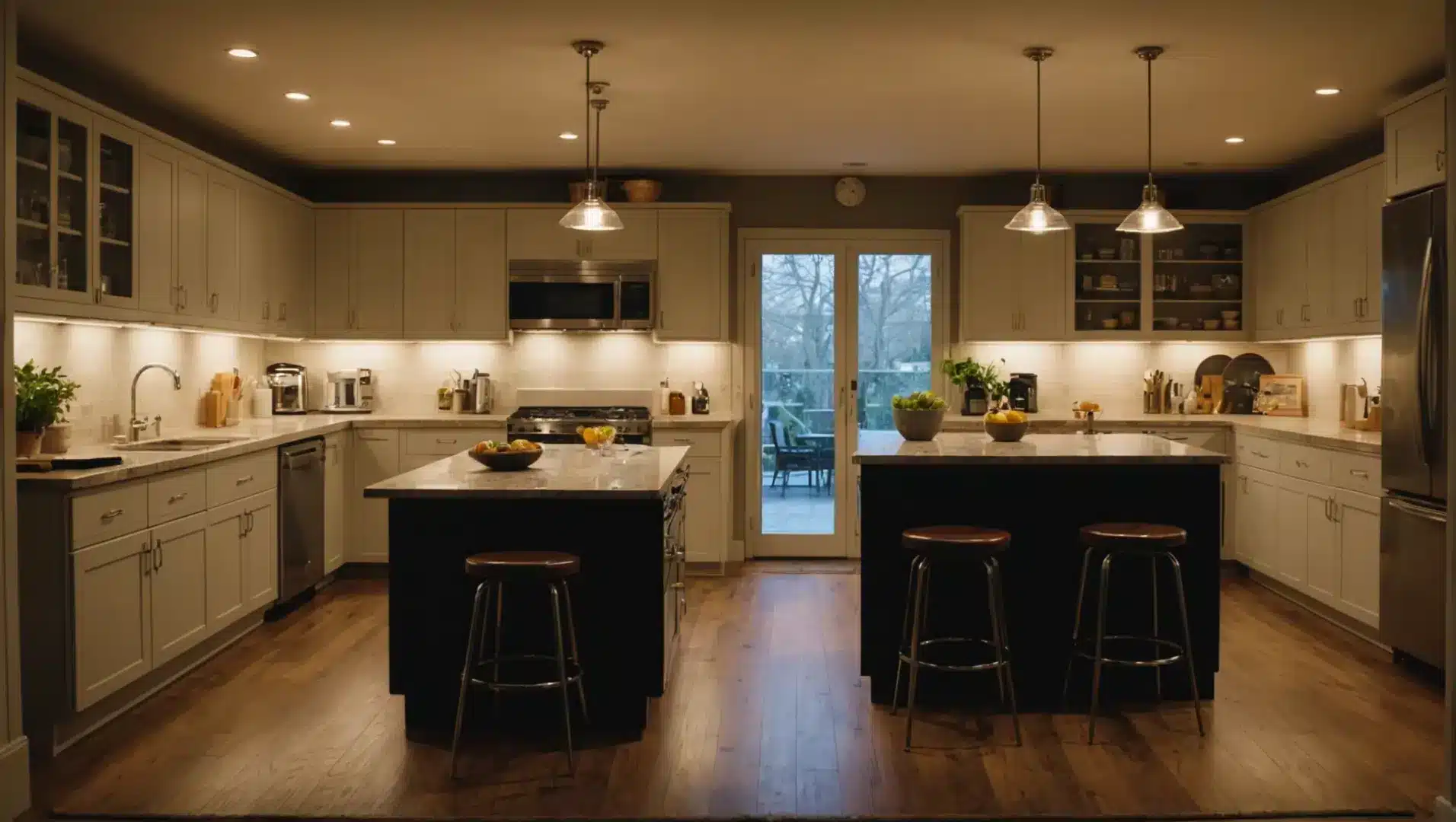
Compact Spaces and Accent Lighting
If you’re looking to illuminate a small area or need focused light for accentuating a specific feature, MR11 bulbs are your go-to choice. Their smaller size6 allows them to fit snugly into tight spaces where MR16 bulbs might not be feasible. Think of recessed lighting in shelves, small display cases, or under-cabinet fixtures in kitchens. Their lower wattage and heat emission make them safe and efficient for these applications.
Larger Areas and High-Output Needs
For larger spaces like living rooms, open kitchens, or outdoor landscapes, MR16 bulbs excel. They provide a higher lumen output compared to MR11 bulbs, which translates to brighter light suitable for broad coverage. Moreover, the superior dimming performance of MR16 bulbs makes them perfect for creating variable ambiance in areas where lighting mood adjustments are desired.
Color Rendering Considerations
In settings where color accuracy is critical, such as art galleries or retail spaces, MR16 bulbs tend to perform better due to their higher Color Rendering Index (CRI). This means they more accurately reveal colors and details compared to MR11 bulbs, making them ideal for environments that require detailed visual tasks.
Energy Efficiency and Cost Implications
While both bulb types are generally efficient, the choice between MR11 and MR16 can impact your energy usage and costs over time. MR11’s lower wattage might save on energy bills in low-use applications. However, if you need higher illumination regularly, the efficiency of an MR16 might actually offer better savings due to fewer units needed to achieve the same brightness.
In summary, understanding the specific requirements of your space and the lighting goals you have will guide you in choosing between these two versatile bulb types. Whether it’s the compact efficiency of MR11 or the robust output of MR16, each has its perfect place.
MR11 bulbs are ideal for outdoor landscapes.False
MR11 bulbs are better for small, confined spaces, not large areas.
MR16 bulbs have better dimming capabilities than MR11.True
MR16 bulbs are noted for superior dimming performance in larger areas.
Conclusion
In summary, understanding the distinctions between MR11 and MR16 bulbs empowers you to select the right lighting solution for your space. Reflect on your needs and preferences to optimize both function and style.
-
Provides precise measurements to ensure proper fixture compatibility.: The main difference between MR11 and MR16 are as follows: 1. Size. The MR-16 bulbs diameter is 2 inch (50mm) SHOP NOW The MR-11 bulbs diameter is 1.375 inch … ↩
-
Explores how size impacts use in different lighting setups.: Directional lamps are a key component of the focal lighting systems that are often used in retail, hospitality, residential, and museum applications. ↩
-
Learn how different wattages and lumens impact energy use.: Wattage affects the amount of energy a light uses, while lumens determine the brightness of a light. The higher the wattage, the more power a … ↩
-
Learn about how CRI affects lighting quality and color accuracy.: Color Rendering Index (CRI) is a way to measure a light source’s distinctive attributes. It is an assessment of how the light source shows object colors … ↩
-
Discover why MR11 bulbs are ideal for compact fixtures.: As compared to PAR, BR and P, the main advantages of MR light bulbs are whiter appearing light, more precise beam control and the small size. MR … ↩
-
Understand how smaller size fits compact spaces effectively.: For instance, MR8 is 8/8 inches (2.5cm or 25mm) in diameter, MR11 is 11/8 inches (3.5cm or 35mm) in diameter, and MR16 is 16/8 inches (5cm or … ↩



